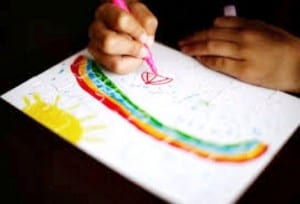
To test children’s reciprocity skills, a tester beings a 10-minute assessment with the instructions “We are going to draw together.” The tester and the child take turns adding elements to a drawing, sketching objects like houses and trees. The child gets points on the task by contributing to the same elements of the scene that the tester is drawing or by going with the flow when the tester makes changes to the drawing. One-hundred and thirty-one children with ASD, aged 6 to 18, participated in the test along with 62 children without ASD.
The drawing test is something of an equalizer. Children with limited verbal skills are able to participate without making conversation. Children with strong verbal skills sometimes use their abilities to obfuscate other struggles. By asking all the children to draw, the researchers were able to directly observe their reciprocity skills without language skills interfering.
Children with ASD received lower scores on the drawing test than the children without ASD. In particular, children with ASD performed worse on the test when the tester added new objects or changed objects the child was drawing. The children with ASD did not adjust well to testers changing their drawings in unexpected ways. This suggests that children with ASD are better at reciprocity when they are in control. In contrast, children without ASD were much more likely to go along with changes initiated by the tester.
Individuals with ASD may experience similar issues with reciprocity in conversation, during which they may tend to talk about their own interests rather than letting someone else direct the conversation. The findings suggest that people with ASD struggle to follow another person’s lead. This finding could lead to targeted interventions for people with ASD.
This research is published in the Journal of Autism and Developmental Disorders.
Previous news in autism:



 © 2025 Unyte Health US Inc.
© 2025 Unyte Health US Inc.